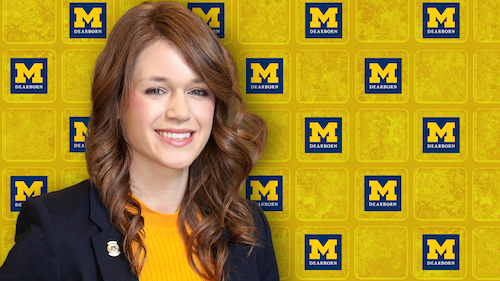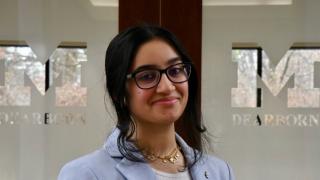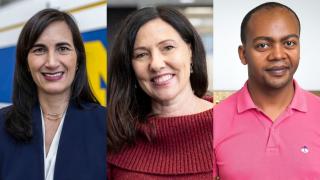When Natasha Young graduates this spring, she’ll be concluding a part of her life that was in many ways never supposed to happen. Growing up in what she describes as an “old-fashioned, very traditional” family, she says the horizon of possibilities and expectations for young women was defined in large part by marriage and motherhood. Young knew at an early age that her own needs for the future extended beyond that. Early experiences like mission trips, working in Detroit soup kitchens, and helping in orphanages in the developing world, left her with a deep passion to serve others. As a teenager, inspired by that sense of justice and her favorite Young Adult good-versus-bad-guy fiction series, she started dreaming of working for the FBI one day. She was so enthusiastic, she even once cold-called the FBI office in Detroit to see what they really did. Someone with a deep voice answered “FBI” on the first ring — just like in the movies — and patiently answered all her curiosities.
There were other experiences that stoked her dreams for the future. When she learned the bureau often recruited people with engineering and computer science backgrounds, she started looking into what it would take to become a cybercrime investigator. She began setting aside money from her two part-time jobs in hopes that she’d find her way to college one day. Working outside the house also gave her a new sense of freedom and independence. “I was homeschooled, so it was almost like a new form of experiencing people,” Young remembers. “I mean, I was just working at a local hardware store and clothing retailer, but I had so much fun. I was socializing in a way I hadn’t before and meeting all kinds of people. I really enjoyed helping them find just what they needed. And the more I did that, the more important work became to me.”
It also became a point of friction within her family — so much so that at age 17, Young decided it would be best to leave home and pursue her education. “There was just something about the excitement of being out in the world and helping people and doing great things,” Young says. “I just felt like I couldn’t help nearly as many people if I chose to stay home and focus on my own family.” So she moved in with her sister and leaned on friends while she figured out her next move. An elderly couple from her church, who she became so close with she now simply refers to them as “grandpa and grandma,” became especially important to her. He was a World War II Air Force veteran; she was a retired educator and the first woman to hold the position of principal in a Michigan school. They’d never had kids of their own, but they seemed to understand where Young was coming from and her deep aspirations to serve others. Most importantly, she says, they supported her with all kinds of wisdom — whether that was general life advice, lessons about how to be disciplined with her time and finances, or answering questions about how to apply for colleges.
With their support and the money she’d saved, Young did make it to college. She started at Schoolcraft College, where like many first-gen students navigating the higher ed system, she racked up nearly enough credits for a bachelor’s degree on her way to an associate’s. With plenty of credits to transfer, she then set her sights on an end game. Her academic counselor had told her about a new digital forensics program at UM-Dearborn, which seemed like a perfect path to a life as a cybercrime investigator. Young transferred, which she remembers was both thrilling and unsettling. To make the finances work and get through her program as quickly as she could, she abandoned much of the rhythm of her old life. She scaled back hours at work, took out a few loans, and went carless so she wouldn’t have to pay for auto insurance. She even gave up her one-bedroom apartment and moved into the Union at Dearborn so she could focus singularly on what she hoped would be the final couple years of college. Rowdy roommates, she recalls, were a necessary compromise.
Young is honest about the fact that it took a little bit to find her footing once she got here. Her path from community college to UM-Dearborn had stretched on for so long, she found herself needing to retake some intro coding classes — just to get her skills back. “Honestly, it was so stressful and so I told myself I was just going to focus on school — I’m not going to get involved with anything else. I just didn’t want to get overwhelmed,” Young says. “But that ended up hurting me more than helping me. I realized I was isolating myself, and I had to break free of that. I’m not joking: I think one day I just started telling people, ‘I’m looking to get involved!’ to see what could happen.”
Soon after, things started clicking. She joined a sorority and was fully embraced by the other women — despite being the self-described “oddball” of the group. What she cherishes about that time, in particular, is that it gave her a chance to learn from the experiences of other young women — something that was mostly lacking from her childhood and classes in a male-dominated field like computer science. Elsewhere, especially with the computer science honor society, Upsilon Pi Epsilon, she helped others find their own strides on campus. Initially reluctant to take on a leadership position, she’s since become one of the campus computer science community’s most tireless advocates. She has a particular passion for their now-frequent hackathon events, which give fledgling coders a fun way to test their abilities. And Young hopes to stay involved with the new cybersecurity-focused Blue Bytes student group even after her time at UM-Dearborn is over.
Now 26, and just days away from graduation, Young calls herself “old” for a college student. “It definitely took me longer than it should have. But that’s the way it is when you’re a first-generation student. There’s so much about getting here and getting through that nobody’s told you that you have to figure out for yourself. Honestly, when you ask me how I’m feeling about the idea of graduating, my first thought is that I want to do my master’s. I have the confidence now. I’d know how to evaluate whether a decision is going to be right for me. I’d know how to speak up being the only woman in a room. I think I could do it right now — without all the detours.”
She has a few ideas for what that next part of her story might look like. In the very near future, it will include a full-time position in the Ford College Graduate program, a coveted rotation-based position that will allow her to try out several specialties before zeroing in on one of her own. Beyond that, her current dreams for a master’s are between law school and cybersecurity. And both would serve her well at the FBI, which hasn’t been relegated to the realm of discarded childhood dreams.
“No matter where I end up, I feel like I’ll have a place to serve and make a difference,” Young says. “I’m a little bit more open-minded than I used to be. I think I felt like I had to choose a path and stick with it or I wouldn’t make it. But now that I’m here, there are so many choices — and so many ways to help others that I never would have had.”




